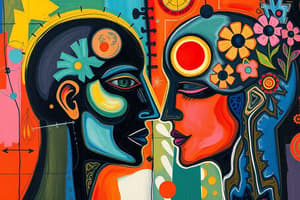Podcast
Questions and Answers
What is the main difference between sensation and perception?
What is the main difference between sensation and perception?
- Sensation involves the interpretation of sensory impressions.
- Sensation gathers elementary impressions; perception gives them meaning. (correct)
- Perception relies solely on the functioning of sensory organs.
- Perception occurs before any sensory input is processed.
Attention in child development is primarily driven by which factor?
Attention in child development is primarily driven by which factor?
- Intellectual capacity
- Interest (correct)
- Emotional stability
- Cognitive flexibility
How does imagination contribute to perception?
How does imagination contribute to perception?
- By creating emotional responses.
- By forming mental images based on past experiences. (correct)
- By solely relying on sensory organs.
- By shutting down sensory input.
Which area is not primarily involved in the mental development of a child?
Which area is not primarily involved in the mental development of a child?
What role does past experience play in perception?
What role does past experience play in perception?
Which of the following statements best describes 'interest' in the context of child development?
Which of the following statements best describes 'interest' in the context of child development?
Which area relates to the ability to engage in problem-solving as a component of mental development?
Which area relates to the ability to engage in problem-solving as a component of mental development?
What can be inferred about the relationship between attention and interest?
What can be inferred about the relationship between attention and interest?
What is the primary role of the Ego in Freud's model of personality?
What is the primary role of the Ego in Freud's model of personality?
During which psychosexual stage does the Oedipus Complex occur?
During which psychosexual stage does the Oedipus Complex occur?
What are erogenous zones according to Freud?
What are erogenous zones according to Freud?
What outcome characterizes fixation in psychoanalytic theory?
What outcome characterizes fixation in psychoanalytic theory?
Which of the following correctly describes the focus of pleasure during the Anal Stage?
Which of the following correctly describes the focus of pleasure during the Anal Stage?
What does Freud mean by the term libido?
What does Freud mean by the term libido?
In the context of Freud’s psychosexual stages, what is meant by 'pious delaying of gratification'?
In the context of Freud’s psychosexual stages, what is meant by 'pious delaying of gratification'?
What is the significance of the phallic stage in personality development according to Freud?
What is the significance of the phallic stage in personality development according to Freud?
Which stage of psychosexual development is characterized by the focus on pleasure centers around the genitals?
Which stage of psychosexual development is characterized by the focus on pleasure centers around the genitals?
What is the main conflict experienced during the Oedipus Complex?
What is the main conflict experienced during the Oedipus Complex?
What term describes a strong fixation at the oral stage of development?
What term describes a strong fixation at the oral stage of development?
In Freud's theory, which of the following best describes the Id?
In Freud's theory, which of the following best describes the Id?
Which of the following is a defining characteristic of fixation in development?
Which of the following is a defining characteristic of fixation in development?
At what stage does the ego begin to develop as a mediator between the Id and reality?
At what stage does the ego begin to develop as a mediator between the Id and reality?
Which erogenous zone is primarily associated with the Anal Stage of psychosexual development?
Which erogenous zone is primarily associated with the Anal Stage of psychosexual development?
What is the primary focus of the latency stage of development?
What is the primary focus of the latency stage of development?
Flashcards are hidden until you start studying
Study Notes
Psychoanalytic Theory
- Id: the impulsive, pleasure-seeking part of the psyche
- Ego: the rational part of the psyche, mediating between the Id and Superego
- Superego: the moral part of the psyche, representing internalized societal rules and values
- Libido: the driving force behind behavior, according to Freud, stemming from sexual energy
- Erogenous Zones: body parts that provide pleasurable sensations during specific developmental stages
- Fixation: a defense mechanism where an individual remains stuck in an earlier developmental stage due to unmet needs
Psychosexual Stages
- Oral Stage: first stage (birth to 18 months), focused on pleasure derived from sucking, biting, and chewing
- Anal Stage: second stage (18 months to 3 years), focused on pleasure derived from controlling bowel movements
- Phallic (Oedipal/Electra) Stage: third stage (3 to 6 years), focused on pleasure derived from genital stimulation, characterized by the Oedipus Complex
- Latency Stage: fourth stage (6 years to puberty), sexual urges are repressed and focus shifts to social and intellectual development
- Genital Stage: fifth stage (puberty onwards), reemergence of sexual desires with a mature focus on interpersonal relationships
Areas of Mental Development
- Sensation: basic sensory impressions gathered through the sense organs
- Perception: interpreted meaning given to sensory impressions, influenced by past experiences
- Concept Formation: the ability to categorize and understand abstract ideas
- Attention & Interest: selective focus on a particular stimulus, driven by motivation
- Imagination: the ability to create mental images and scenarios
- Language Development: the acquisition of language skills, including vocabulary, grammar, and communication
- Memory: the ability to store, retain, and retrieve information
- Problem-Solving Ability: the ability to identify and solve challenges
Human Development
- Developmental Psychology: branch of psychology focused on describing and explaining changes across the lifespan
- Human Development: how people change and remain the same over time
- Quantitative Change: changes in amount or degree
- Qualitative Change: changes in kind or structure
- Stable Traits: characteristics that tend to remain consistent throughout life
- Unstable/Plastic Traits: characteristics that can change based on external factors
- Normative Influences: biological and environmental factors that affect most people in similar ways
- Age-Graded: specific to a particular age group
- History-Graded: common to a particular generation
- Non-Normative Influences: unusual events that have a significant impact on an individual
Studying That Suits You
Use AI to generate personalized quizzes and flashcards to suit your learning preferences.




